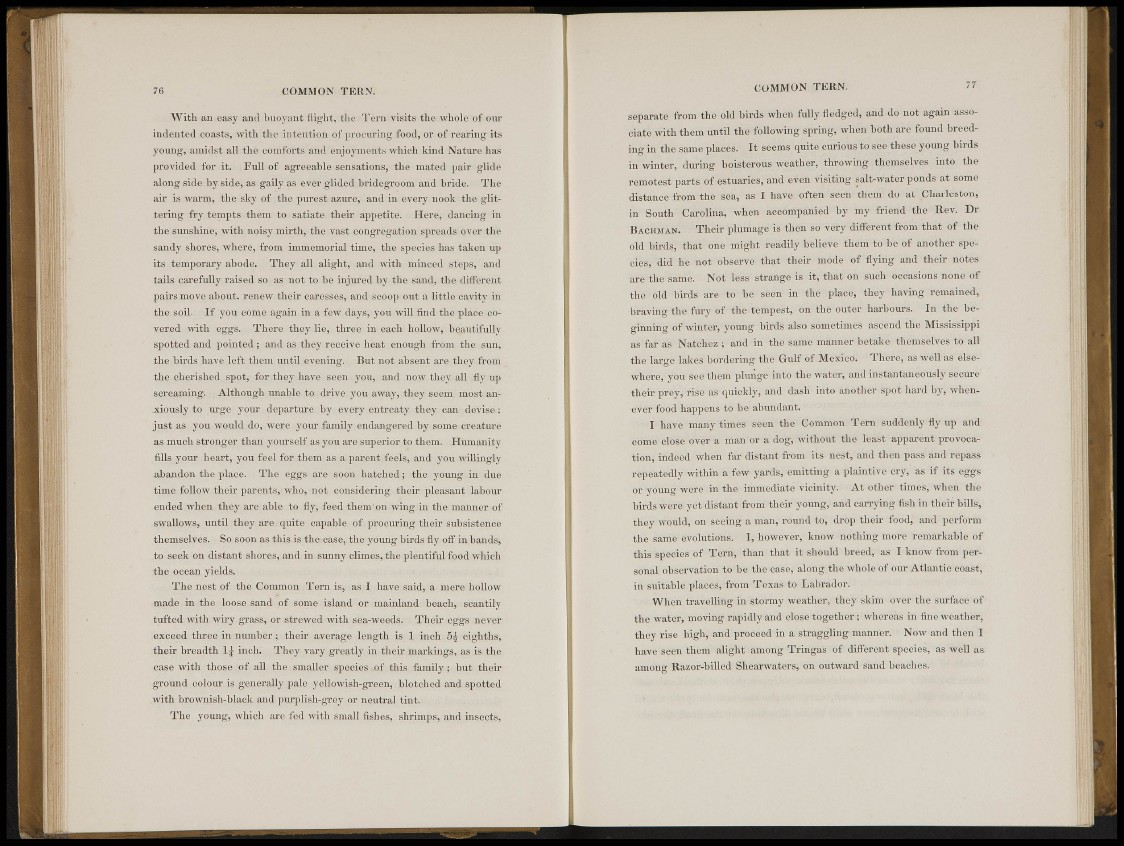
76 C O M M O N TERN.
With an easy and: buoyant, flight, the Tern visits the whole of our
indented coasts, with the intention ¡of procuring food, or of rearing its
young, amidst .all the comforts and enjoyments..which-kind Nature has
provided for it. Full of agreeable sensations, the mated pair glide
alongside by side, as gaily as ever glided bridegroom and bride..- The
air is warm, the sky of the purest azure, and in every nook the- glittering
fry tempts. them to satiate their appetite. Here,, dancing in
the sunshine, with noisy mirth, the vast congregation spreads over the
sandy shores, whore, from immemorial time, the species: has taken up
its temporary ahofc,-.':, They all alight, and with minced steps, and
tails carefully raised so as not to be injured by the .sand, the différent
pairs moV^inbout, renew their caresses, and «coop out a little cavity in
the soil. . If you-.come again in a few days, you will find the place'covered
with eggs.. There they lie, throe- ill each holknv, beautifully:
spotted and pointed ; and as th<$'j receive heat enough from the sun,
the birds have .loi't them until, evening. But not absent are tliey/from
the cherished spot,, for they have seen you, and .now tliev all fly up
•screa-ming. -, Although unable to drive you away, the-y seem most, anxiously
to .urge; your departure by .every entreaty they, .can devise.;
just as y.ou would do, were your family.endangered l»\ .some creature
as much:.stronger than yourself'.as you are superior to them. Humanity
fills your heart, you fe.el for them as a parent feel*, andr^you willingly
abandon the place. Thé: eggs are soon hatched ; the y oung in due
time follow their parents,, who,mot considering their pleasant labour
..ended when they are able to fly, feed them'on wing in the manner of
.swallows, until they- are; quite capable of. procuring their subsistence
themselves. So. soon as this is the i:a.se,:the voting birds fly off in bands,
to seek on distant shores, and in sunny climês, the plentiful food which
the ocean yields.
The nest of the Common Tern is, as I have said, a mere hollow
made in the loose sand of some island or mainland beach, scantily
tufted with wiry grass, or strewed with sea-weeds. Their eggs never
exceed three in number ; their average length is 1 inch 5J eighths,
their breadth 1J inch. They vary greatly in their markings, asis the
case with those..'of all the.smaller species»»!' this family ; but their
ground colour is generally pale yellowish-green, blotched and spotted
.with brownish-black and purplish-grey or neutral tint.
The young, which are J$i|$i£h small fishes, shrimps, and insects,
C O M M O N TERN. 77
separate from the old birds when fully fledged, and do not again associate
with them until the following spring, when both are found breeding
in the same places.' It seems quite curious to see these young birds
in winter, during boisterous weather, throwing themselves into the
remotest parts of estuaries, and even visiting salt-water ponds at some
distance from the sea, as I have often seeri' them do at Charleston,
in South Carolina, when accompanied by mv friend the Rev. I)r
BACHMAN. Their plumage is then so very different from that of the
old birds, that one might readily believe t&affito be of another specks,
did he not. observe that their mode of flying and their notes
are the same. Not less strange is it, that on such occasions none of
the old birds are to litf 'seen in the place, Hïicy having remained,
braving the fury of the-tempest, on the outer harbours. In the beginning
of winter, young birds also sometimes ascend the Mississippi
as fai' as Natchez ; and in the same manner betake themselves to all
the largo listes bordering the Gulf of Mexico. There, as Well as elsewhere,
you see then) plunge into the watery and instantaneously secure
their prey, rise as quickly, and dash into another spot, hard by, whenever
food happens to be abundant.
I have many times seen the Common Tern Suddenly fly up and
come close over a man or a dog, without the least apparent provocation,
indeed when far distant from its nest, and then pass and repass
repeatedly within a few yards, emitting a plaintive cry, as if its eggs
or young were- in the immediat|'>Vicffiity. At other-times, when the
birds were: yet distant from.'their young, and carrying fish in their bills,
they would, on siieing a man, rftund to, drop their • food, and perform
the same evolutions. I, however, know nothing more remarkable of
this species of Tern, than that it should breed, -as I know from personal
observation to bey-She case, alotig the whole of'our Atlantic coast,
in suitable places, from Texas to Labrador.
When traveUingi Sn%tormy Weather, they skim over the surface of
the water, moving rapidly and close together ; whereas in fine weather,
they rise high, and proceed in a straggling manner. Now and then I
have seen them alight among Tringas Of different species, as well as
among Razor-billed Shearwaters, on outward sand beaches.